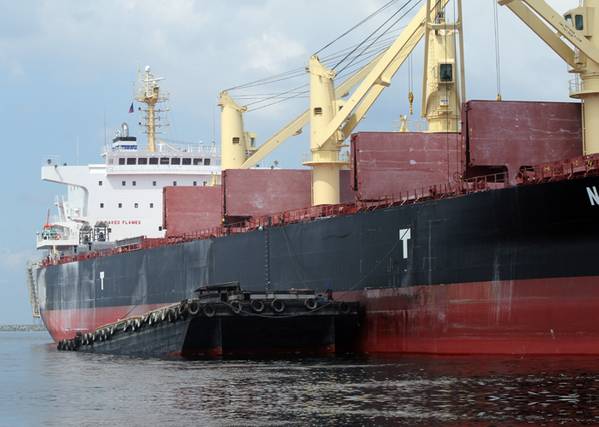IMO Warns on Bauxite Liquefaction Dangers
Posted by Eric Haun
September 18, 2015

Photo: IMO
The International Maritime Organization (IMO) announced it has taken action to warn ship masters of the possible dangers of liquefaction associated with carriage of bauxite, following consideration of findings from the investigation into the loss of the 10-year-old Bahamas flag bulk carrier Bulk Jupiter, which was carrying 46,400 metric tons of bauxite when it sank rapidly with 18 fatalities in January 2015.
A circular approved by IMO’s Sub-Committee on Carriage of Containers and Cargoes (CCC), meeting this week at IMO Headquarters, warns ship masters not to accept bauxite for carriage unless the moisture limit for the specific cargo is certified as less than the indicative moisture limit of 10 percent and the particle size distribution as is detailed in the individual schedule for bauxite in the IMSBC Code; or the cargo is declared as Group A (cargoes that may liquefy) and the shipper declares the transportable moisture limit (TML) and moisture content; or the cargo has been assessed as not presenting Group A properties.
The circular notes that while bauxite is currently classified as a Group C cargo (cargoes that do not liquefy or possess a chemical hazard) under the International Maritime Solid Bulk Cargoes (IMSBC) Code, there is a need to raise awareness of the possible dangers of liquefaction associated with bauxite. If a Group A cargo (cargo which may liquefy) is shipped with moisture content in excess of its transportable moisture limit (TML), there is a risk of cargo shift, which may result in capsizing.
The mandatory IMSBC Code requires Group A cargoes to be tested, before loading, to determine their TML and their actual moisture content. The testing should confirm the cargo is below the maximum moisture content considered safe for carriage.
The Sub-Committee was informed of the marine safety investigation into the loss of the Bulk Jupiter, which has uncovered evidence to suggest liquefaction of cargo led to loss of stability. Ongoing research to evaluate the properties of bauxite is being carried out by Australia and Brazil, while an ongoing research project in China suggests that bauxite has various behaviors, based on the parent rock and how the materials weather.
The Sub-Committee also established a correspondence group to evaluate the properties of bauxite and coal (some types of coal may liquefy) and consider any necessary amendments to the IMSBC Code.





